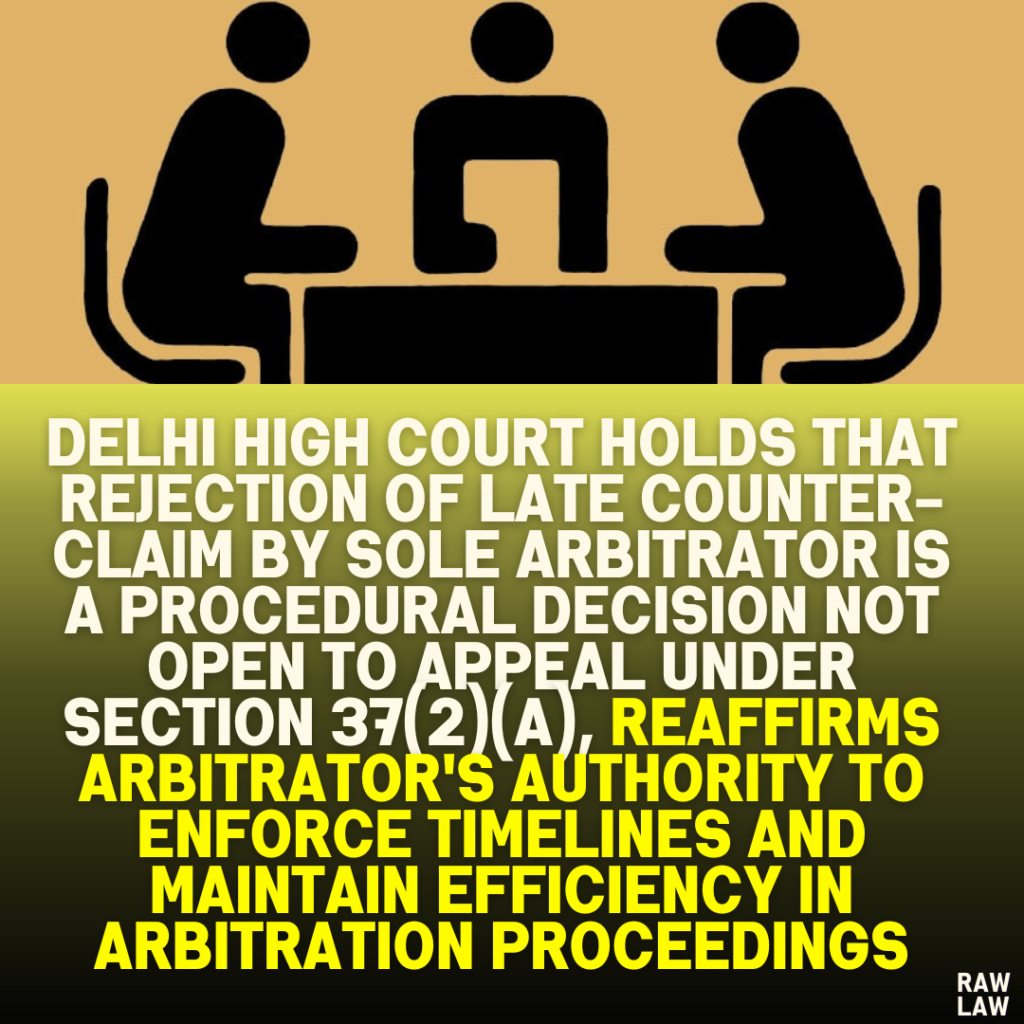Court’s Decision:
The Delhi High Court dismissed the appeal filed under Section 37(2)(a) of the Arbitration and Conciliation Act, 1996. The appeal challenged the Sole Arbitrator’s procedural decision rejecting a request for condonation of delay in filing a counter-claim. The Court held that the Arbitrator acted within his jurisdiction under Section 23 of the Act. It ruled that procedural orders like these are not subject to appeal under Section 37(2)(a). However, the Court clarified that the Appellant retains the right to pursue its counter-claim through independent arbitration proceedings.
Facts:
- Background:
- The Appellant (RailTel Corporation) entered into a definitive agreement with the Respondent (Primate Fibcom) for the latter to act as a System Integrator and Implementation Partner for a project.
- Payments were to flow through a back-to-back structure where the Appellant was to receive funds from the end customer, M/S RajCOMP Info Services Limited (RISL), before paying the Respondent.
- Disputes:
- RISL stopped payments, citing deficiencies in the Respondent’s services. This led to disputes between the Appellant and the Respondent.
- Arbitration Proceedings:
- The Respondent invoked arbitration under the agreement, and a Sole Arbitrator was appointed by the Delhi High Court.
- Procedural orders were issued to set timelines for pleadings. The Appellant was initially given time to file its counter-claim but failed to do so within the prescribed deadlines.
- Delay and Procedural Rejection:
- At the stage of final arguments, the Appellant moved an application for condonation of delay in filing the counter-claim. The Arbitrator rejected the application, citing the advanced stage of proceedings.
- Present Appeal:
- The Appellant filed an appeal under Section 37(2)(a) of the Act, arguing that the Arbitrator’s rejection amounted to a refusal of jurisdiction.
Issues for Consideration:
- Can the procedural order rejecting condonation of delay in filing a counter-claim be appealed under Section 37(2)(a)?
- Does the Arbitrator’s order constitute an interim award appealable under Section 34?
- What remedies are available to the Appellant for adjudicating its counter-claim?
Petitioner’s (Appellant’s) Arguments:
- Refusal of Jurisdiction:
- The Appellant argued that the Arbitrator’s rejection of the counter-claim effectively amounted to a refusal to exercise jurisdiction under Section 16(2), making it appealable under Section 37(2)(a).
- Arbitrary Procedure:
- The Appellant claimed the Arbitrator acted arbitrarily by failing to establish proper procedures under Section 19 of the Act or follow DIAC rules.
- Independent Nature of Counter-Claims:
- The counter-claim, being independent of the main claim, should have been considered regardless of the delay.
Respondent’s Arguments:
- Procedural Order:
- The Respondent countered that the Arbitrator’s decision was procedural, falling within the Arbitrator’s jurisdiction under Section 23, and therefore not appealable under Section 37(2)(a).
- Delay in Filing:
- The Appellant had multiple opportunities to file the counter-claim within extended deadlines but failed to do so. Allowing it at the final stage would disrupt the arbitration’s expeditious nature.
- Remedy Still Available:
- The Appellant could initiate separate arbitration for its counter-claim and was not prejudiced by the procedural rejection.
Analysis of the Law:
- Sections Analyzed:
- Section 37(2)(a): This section allows appeals against orders where an Arbitrator accepts pleas of lack of jurisdiction or excessive jurisdiction under Section 16(2) or (3).
- Section 23: It empowers Arbitrators to set timelines for pleadings, including counter-claims, and reject claims filed beyond such timelines.
- Procedural Orders Are Not Appealable:
- The Court emphasized that procedural decisions (e.g., rejecting condonation of delay) do not fall within the scope of Section 37(2)(a).
- Such procedural orders are considered part of the Arbitrator’s jurisdiction and must await final awards to be challenged under Section 34.
Precedent Analysis:
- National Thermal Power Corp. v. Siemens Atkeingesekkschaft:
- The Supreme Court clarified that procedural orders rejecting claims for valid reasons are not a refusal of jurisdiction and cannot be appealed under Section 37(2)(a).
- Vil Rohtak Jind Highway Pvt. Ltd. v. NHAI:
- Procedural orders denying amendments or inclusion of claims are not interim awards and can only be challenged after the final award under Section 34.
Court’s Reasoning:
- Jurisdiction Properly Exercised:
- The Arbitrator exercised jurisdiction in rejecting the condonation of delay. This rejection was based on procedural grounds, not on the merits of the counter-claim.
- Belated Application:
- The counter-claim was filed after multiple deadlines and at the stage of final arguments. Accepting it would have undermined the objective of timely arbitration.
- No Interim Award:
- The Arbitrator’s decision did not address the merits of the counter-claim or foreclose its adjudication in the future. Thus, it was not an interim award under Section 34.
- Remedy Still Exists:
- The Appellant retains the right to initiate separate arbitration for the counter-claim and was not deprived of substantive rights.
Conclusion:
The Court dismissed the appeal, holding it as not maintainable under Section 37(2)(a). It emphasized that procedural orders rejecting belated claims cannot be challenged as refusals of jurisdiction. The Appellant was granted the liberty to pursue its counter-claim through separate arbitration.
Implications:
- Reinforcing Arbitration Efficiency:
- This judgment underscores the importance of adhering to procedural timelines in arbitration proceedings to ensure swift resolution of disputes.
- Limited Appeals:
- The ruling reinforces the restricted scope of appeals under Section 37, emphasizing that procedural orders must be challenged only after the final award is made.
- Separate Arbitration for Counter-Claims:
- Parties are reminded that counter-claims remain independent and can be pursued separately if not included in the original proceedings due to procedural delays.
